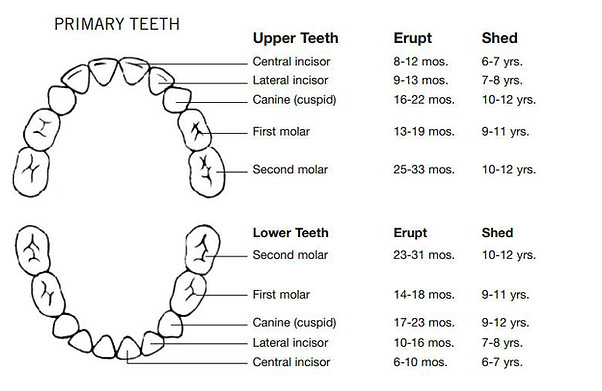Early Dental Care
Brushing
First things first: Effective home care will prevent the majority of dental problems. Watch our videos to learn how to do it well!
Teething
A baby's first tooth typically erupts between 6 to 12 months of age. Gums are sore, tender and sometimes irritable until the age of 3. Rubbing sore gums gently with a clean finger, the back of a cold spoon or a cold, wet cloth helps soothe the gums. Teething rings work well.
Preventing Baby Bottle Tooth Decay
Tooth decay in infants can be minimized or totally prevented by not allowing sleeping infants to bottle-feed. Infants that need a bottle to comfortably fall asleep should be given a water-filled bottle or a pacifier. While your baby is teething, it is important to monitor the teeth for signs of baby bottle decay. Examine the teeth, especially on the inside or the tongue side, every two weeks for dull spots (whiter than the tooth surface) or lines. A bottle left in an infant's mouth while sleeping can cause decay. This happens because sugar in the liquid mixes with bacteria in dental plaque, forming acids that attack the tooth enamel. Each time a child drinks liquids containing sugar, acids attack the teeth for about 20 minutes. When awake, saliva carries away the liquid. During sleep, the saliva flow significantly decreases and liquids pool around the child's teeth for long periods, covering the teeth in acids.
Infant's New Teeth
Primary (baby) teeth play a crucial role in dental development. Without them, a child cannot chew food properly and has difficulty speaking clearly. Primary teeth are vital to development of the jaws and for guiding the permanent teeth into place when they replace the baby teeth around age 6. Since primary teeth guide the permanent teeth into place, infants with missing primary teeth or infants who prematurely lose primary teeth may require a space maintainer, a device used to hold the natural space open. Without a maintainer, the teeth can tilt toward the empty space and cause permanent teeth to come in crooked. The way your child cares for his/her primary teeth plays a critical role in how he/she treats the permanent teeth. Children and adults are equally susceptible to plaque and gum problems—hence, the need for regular care and dental check-ups.
Infant Tooth Eruption
A child's teeth actually start forming before birth. As early as 4 months of age, the primary (baby) teeth push through the gums—the lower central incisors are first, then the upper central incisors. The remainder of the 20 primary teeth typically erupt by age 3. Permanent teeth begin eruption around age 6, starting with the first molars and lower central incisors. This process continues until around age 21. Adults have 28 permanent teeth—32 including the third molars (wisdom teeth).
A Child's First Dental Visit
Along with the American Academy of Pediatric Dentistry, we recommend that a child's first dental visit be scheduled by his/her 1st birthday. It is very important to make the first visit as positive and enjoyable for the child as possible. We want your child to enjoy getting to know our team and be comfortable at all times! A pleasant, comfortable first visit builds trust and helps put the child at ease during future dental visits. Let your child know that the dentist and staff will explain everything in detail and will answer any questions he/she has. Children should be encouraged to discuss any fears or anxiety they feel.
Parents, please refrain from using any words that could cause unnecessary fear, such as "needle" or "drill." We are experienced in dealing with children with anxiety and can explain treatment procedures in a positive, pleasant manner to avoid any anxious or negative feelings toward dentistry.
We will record your child's dental and medical history, complete a comprehensive examination and discuss any findings with you. We will also review with you and your child the importance of maintaining a good at-home oral hygiene routine to ensure that your child keeps a healthy, beautiful smile for life!
Good Diet and Healthy Teeth
The teeth, bones and soft tissue of the mouth require a healthy, well-balanced diet. A variety of foods from the five food groups helps minimize (and avoid) cavities and other dental problems. Children should receive healthy foods like vegetables, low-fat yogurt and cheeses, which promote strong teeth.
Source: Dentaly.org




